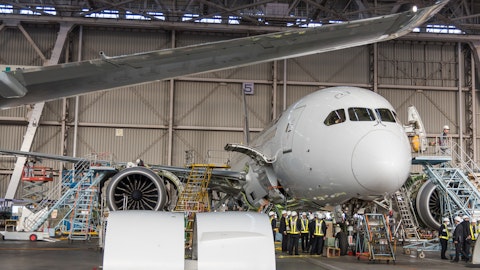Peter Arment: Scott, just circling back on David’s question regarding just the supply chain and maybe just tacking and inflation. So it sounds like — I mean, it sounds like things are holding in there? Or are they getting a little better? And then just also, just could you maybe talk a little bit how you’re passing in the higher input costs right now?
Scott Donnelly: Well, on the supply chain side, Peter, I think we have some suppliers where we’ve had challenges, and we clearly see them getting healthy and getting better. But we have other areas where suppliers are still struggling. I mean, I don’t want to go into too much detail, but it’s very specific components, very specific suppliers. Obviously, we’re working with them and trying to get them healthy and do a better job in terms of getting parts into the factory. And obviously, from our standpoint, we do lots of out-of-sequence work and swapping parts around. We’d like to stop doing that. It’s an efficiency hit to us. Our guys have to work through every day. So I think it’s about the same, right? As I said, there are some suppliers that are getting better but then you got one that’s just having a hard time catching up.
I don’t know that we’re seeing a lot of new suppliers coming in and say, hey, I got a big problem. We have a couple there we’ve been struggling all year, and we’re trying to get them back on schedule. They’re working at it, but they’re just not quite there yet. And again, we factored that into how we think 2023 will play out. In terms of the pricing side of things, Peter, we continue to get price, net of inflation. We’re very focused on that. As these input costs increase, we got to drive price to get that back. I think the guys are doing a pretty good job of that.
Peter Arment: And just as a quick follow-up on systems, I mean, just could you talk a little bit post the bill and defense kind of looking funding pretty robust as we go forward. How are you looking at, we’re showing modest growth for systems this year, but how do you think longer term?
Scott Donnelly: Well, look, I think when we look at the numbers, they seem fine to us. When you look at what came through on the omnibus in terms of this current fiscal year’s budget, was in line with our expectations. So I think we’re fine. The growth, the good news at systems is it’s really kind of across almost all the product lines. It’s not just one particular thing. Obviously, we’ve had some new wins in the munition side, which is great. That’s put that business back to growth. Sentinel program continues to do well. Our ship-to-shore, as I said, we’ve made deliveries. We’ll start negotiating the next production by here shortly, but we’ll finish the DD&C this year and start production deliveries. The ATAC business has had nice growth. Our electronics business has had a nice growth. It really is kind of across all of the businesses within systems. And the omnibus budget that was appropriated is consistent with obviously what we’re guiding to you guys.
Peter Arment: Appreciate the color. Thanks, Scott.
Operator: Your next question comes from the line of Pete Skibitski from Alembic Global. Please go ahead.
Peter Skibitski: Scott, fair to say, I think some of your businesses have a cyclical component to them. And I’m just wondering I’m sure you guys see, I think the consensus out there for the macro guys is that we’ll have some sort of mild recession this year, maybe later this year. So as you guys see that and whether you agree with it or not, is it prudent for you to maybe even kind of slow the top-line growth in those type of businesses in maybe like Citation, maybe TSV to kind of protect your margins and not over hire? Are you guys thinking about your businesses that way or not necessarily right now?
Scott Donnelly: We absolutely look at that, Peter. I mean, as I said, there’s cyclicality in almost every business, right? So some have more than others. Those that we think are going to be more recession sensitive we’ve kind of factored in thinking we’ll have a mild recession. I don’t think it’s going to be dramatic. We’re certainly not thinking about something in the scope of back in the 2009, ’10 kind of time frame. But I don’t think we have an economic situation that’s going to lead to something like that. I’d say, look, I think when you look back at previous modest recessions, the area that has always impacted us the most difficult has been a slowdown in the aviation business. And I think we’re in a very different place than we’ve been in those previous sessions because we have a pretty significant backlog.





